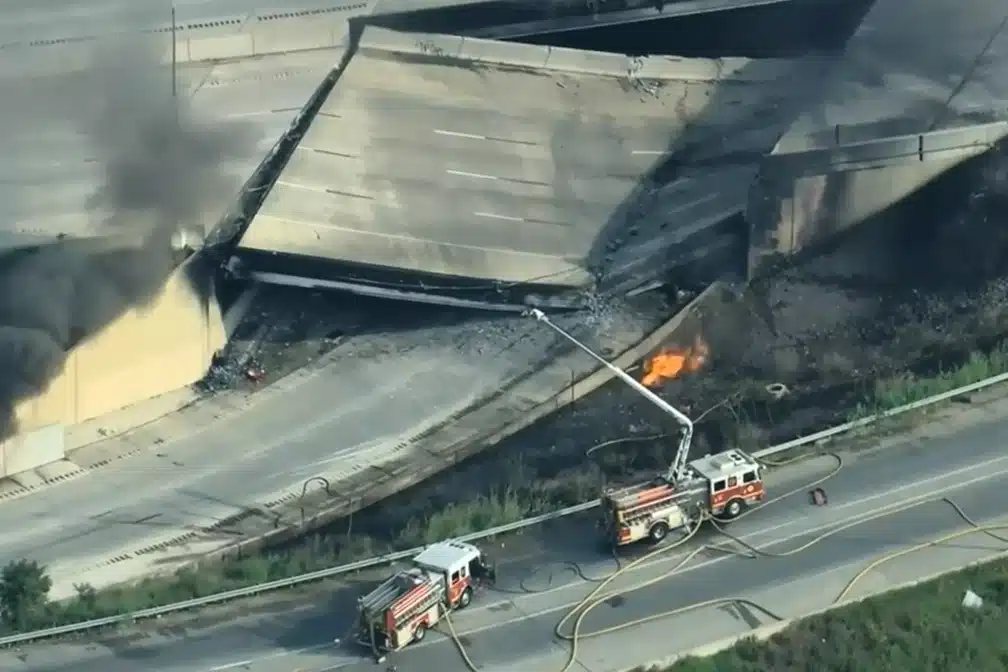Over the last two decades, Freightliner has demonstrated its ability to adapt to changing industry dynamics and evolving customer needs. From the early 2000s, when it became
More
May 19, 2024 7:27 pm

The recent I-95 collapse of a section of Philadelphia has raised concerns about its potential impact on the supply chain industry. The American Trucking Association (ATA) has warned that the collapse will likely lead to significant disruptions and delays, affecting both regional transportation and commuters in Philadelphia. With approximately 8-9% of vehicles passing through this section being commercial trucks, the detour and increased travel time will add substantial costs to the industry. This article explores the importance of I-95 as a vital artery for the East Coast and regional transportation, examines the implications of the collapse on the supply chain, and emphasizes the need for prompt repair and replacement efforts by state and federal agencies.
I-95 serves as a crucial transportation route not only for the East Coast but also for regional movements and commuters in Philadelphia. The collapsed portion of the highway carries around 150,000 vehicles daily, including 14,000 trucks, according to the Delaware Valley Regional Planning Commission. It acts as a prime corridor for regional freight movement, connecting various industrial businesses such as port facilities and manufacturing centers. Kristen Scudder, the City of Philadelphia’s planning commission freight program manager, highlights the potential impact on these industries due to delays and diversions caused by the collapse.
As a truck driver, you can read the truck industry news-related articles.

Related News:
The collapse of I-95 will undoubtedly have a significant impact on the supply chain industry. The ATA estimates that commercial trucks make up a notable 8-9% of vehicles passing through the affected section. With the collapse forcing a detour of over 40 miles, primarily through non-interstate highways with numerous traffic lights, truckers will face substantial challenges in terms of time, fuel consumption, and increased delays. These factors will contribute to rising costs and logistical complications for businesses relying on the efficient movement of goods.
Tumar Alexander, the managing director for the City of Philadelphia, acknowledges that the incident will have a lasting impact on the local community. Delays in deliveries snarled commutes, and disruptions to daily operations are expected consequences of the collapse. Moreover, surface street delays and diversions will likely affect shipments coming in and out of the region, potentially causing further disruptions for businesses relying on the affected portion of the highway.
Secretary of Transportation Pete Buttigieg, during his visit to Philadelphia, recognized the potential implications for the cost of goods. Any disruptions, longer routes, or extended waiting times for trucks ultimately translate into increased expenses that may be passed on to consumers. This ripple effect can affect various industries and consumers along the supply chain.
The Need for Swift Repair and Replacement Efforts (300 words) Repairing and replacing the collapsed section of I-95 is of paramount importance to minimize the impact on the supply chain. Federal assistance has been promised by Secretary Buttigieg, emphasizing the significance of prompt action. State and federal agencies should prioritize allocating appropriate resources to expedite the repair process.
The duration of the repairs remains uncertain, with Pennsylvania Governor Josh Shapiro suggesting it could take several months. However, Pennsylvania Department of Transportation Secretary Mike Carroll has committed to working around the clock to address the problem efficiently and restore normal traffic movements as soon as possible.
The collapse of I-95 in Philadelphia has raised concerns about the significant impact it will likely have on the supply chain industry. With a considerable portion of vehicles passing through the affected section being commercial trucks, the detour and additional travel time will lead to increased costs, delays, and logistical challenges for businesses. Prompt repair and replacement efforts by state and federal agencies are crucial to minimize the disruptions and restore normal traffic movements. Appropriate resources must be allocated to expedite the repair process. The collapse serves as a reminder of the critical role that infrastructure plays in maintaining efficient supply chains and underscores the need for proactive maintenance and investment in the nation’s transportation networks.
For more information and articles from the trucking industry, follow us on Facebook or subscribe to our Truck Driver News newsletter.
Over the last two decades, Freightliner has demonstrated its ability to adapt to changing industry dynamics and evolving customer needs. From the early 2000s, when it became
MoreThe Class 8 trucking industry plays a critical role in the economy by transporting goods across long distances. Recent market trends indicate fluctuations in demand. According to
MoreCalifornia's ZEV Mandate Presents Difficult Realities for Truckers: Balancing Sustainability and Trucking Needs in the Issue of Zero Emission Vehicles.
MoreAutonomous Vehicles are meant to enhance trucking, not to replace truckers. Safety, efficiency, and sustainability value adds benefit the industry
MoreThe electrical system of OTR (Over-The-Road) trucks plays a vital role in ensuring the proper functioning of various components and
MoreThe 2023 American Truck Historical Society (ATHS) National Convention and Truck Show has brought together hundreds of trucks from across
MoreKeeping Up With Trucking Technology Why is it important for Over-the-Road (OTR) drivers to keep up with new technologies? Safety
MoreA truck driver's career can contribute to a fatigue safety problem due to several factors such as demanding schedules that
More